|
Introduction
quick link for future ref: johnnewton.org/ringletters
Letters to Thomas and Sophia Ring of Reading
|
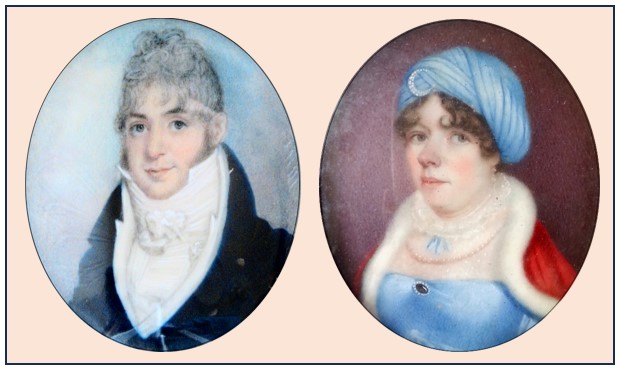 |
from John Newton and Betsy
|
 |
|
WB Cadogan
|
Thomas and Sophia Ring became members of St Giles, Reading, where they were converted under the evangelical ministry of William Bromley Cadogan (1751-1797).
Cadogan himself had been converted under the patient friendship and prayers of Sarah, widow of Cadogan’s predecessor William Talbot (1717-1774).
|
|
|
Newton had known the Talbots for many years and kept in touch with Sarah, preaching at meetings in her house. Some of his letters to her were published in Cardiphonia.
|
|
On 8 August 1793 Newton and his niece Betsy Catlett, whom he had adopted when she was orphaned at the age of 5, set out from London for his annual summer holiday at the home of Walter Taylor (1732-1803) of Portswood Green, Southampton. Taylor, a marine engineer nicknamed ‘Nelson’s Boffin’, had first offered hospitality to the Newtons when their other adopted niece, Eliza Cunningham, was advised to bathe in the sea for her health. Portswood Green became a place of many poignant memories for Newton. On the one hand these included memories of kindness and respite from city life and on the other they reminded him of the last visits with his dear Eliza and his wife Mary/Polly before their deaths. Travelling to Southampton he often stopped off at Reading.
Walter Taylor
|
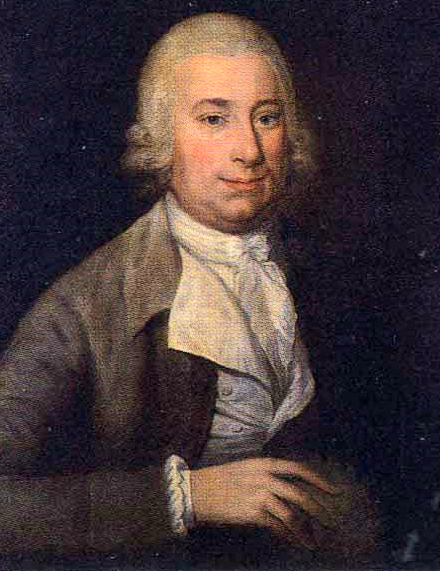 |
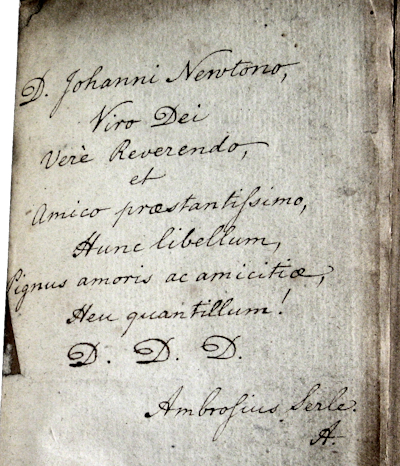 |
En route this time, they first stayed with Ambrose Serle (1742–1812) at his home in Heckfield, near Reading, where Newton led morning and evening family devotions. Serle had been Under-Secretary to Lord Dartmouth (1731-1801), Solicitor and Clerk of the Reports for the Board of Trade, private secretary to Gen William (later Lord) Howe (1729-1814) during the American War of Independence and later Commissioner of the Transport Service.
Serle’s Journal was used as the basis for the 1997 PBS documentary series Liberty! The American Revolution
Inscription in a copy of 'The Christian Remembrancer' presented to Newton by Serle |
|
Newton's Diary states that on |
Wednesday 14 August 1793 ‘Mr & Mrs Ring’ came to dinner at Serle’s. |
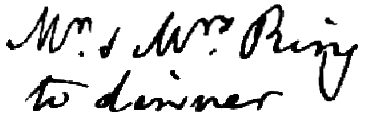 |
|
After holidaying as usual with Walter Taylor and family at Portswood Green, Southampton, and Charles Etty (c 1719-1797) at Priestlands, near Lymington, Newton returned to Heckfield on 18 September. |
|
Diary: |
Wednesday 18 September 1793
Thy mercy and goodness, which gave us much comfort at Portswood, brought us safely to Heckfield this day.
Friday 20 September 1793
I praise thee, my Lord, for another good day. Morning and evening walks – the Rings and Jefferson to dinner. |
|
|
Saturday 21 September 1793
Walked first myself to offer praise for thy mercies O Lord, and to entreat thy protection forwards – in the forenoon with Mr Serle. At 4pm took leave. At 6 arrived at Mr Ring’s Reading.
I have reason to believe that the Providence of the Lord was signally concerned in leading me to Reading.
|
|
|
Tuesday 24th September:
In the evening by Mr Ring’s desire, we had a meeting in his drawing room of about 40 people. I spoke from Romans 12:1,2 [on not being conformed to the world but spiritually renewed in your mind]. I thank thee, my Lord, for the hope that it was a good time. And, especially that thou hast enabled this young couple to give such a public testimony, that they are decidedly on the side of thy Gospel. How soon canst thou damp the glare of the world, and give those whose hearts thou drawest to thyself, much more and better than they ever conceived of, while living in gaity.
|
|
Their bold stand in showing their new allegiance to Christ by holding a Bible study in their home astounded Newton. When he arrived back in London he wrote to them on 1 October 1793: |
|
|
'Please to give my love to your forty friends, and mine, whom I had the pleasure of meeting in the drawing-room. When you first spoke of inviting some friends to meet me, I thought they would be only a few to dinner or tea, and was not in the least aware of the public step you were going to take. I was a little apprehensive for the consequences. But by what I saw and heard before and after, I am persuaded that it was not the effect of a transient warmth, but that you had deliberately counted the cost, and were willing to let it be known far and near, that you had made up your minds, and were determined by the grace of God, that whatever others do, you and your house, so far as your influence can prevail, will serve the Lord [Joshua 24:15]. In this view, I greatly rejoiced in the opportunity, and it pleased me highly to see a room consecrated to Him, which I suppose has formerly been filled in a very different manner.'
|
|
They had clearly been socialites in the past and were now making a public statement as to their new allegiance. We get an intriguing glimpse into their past from their marriage certificate, signed at Gretna Green: |
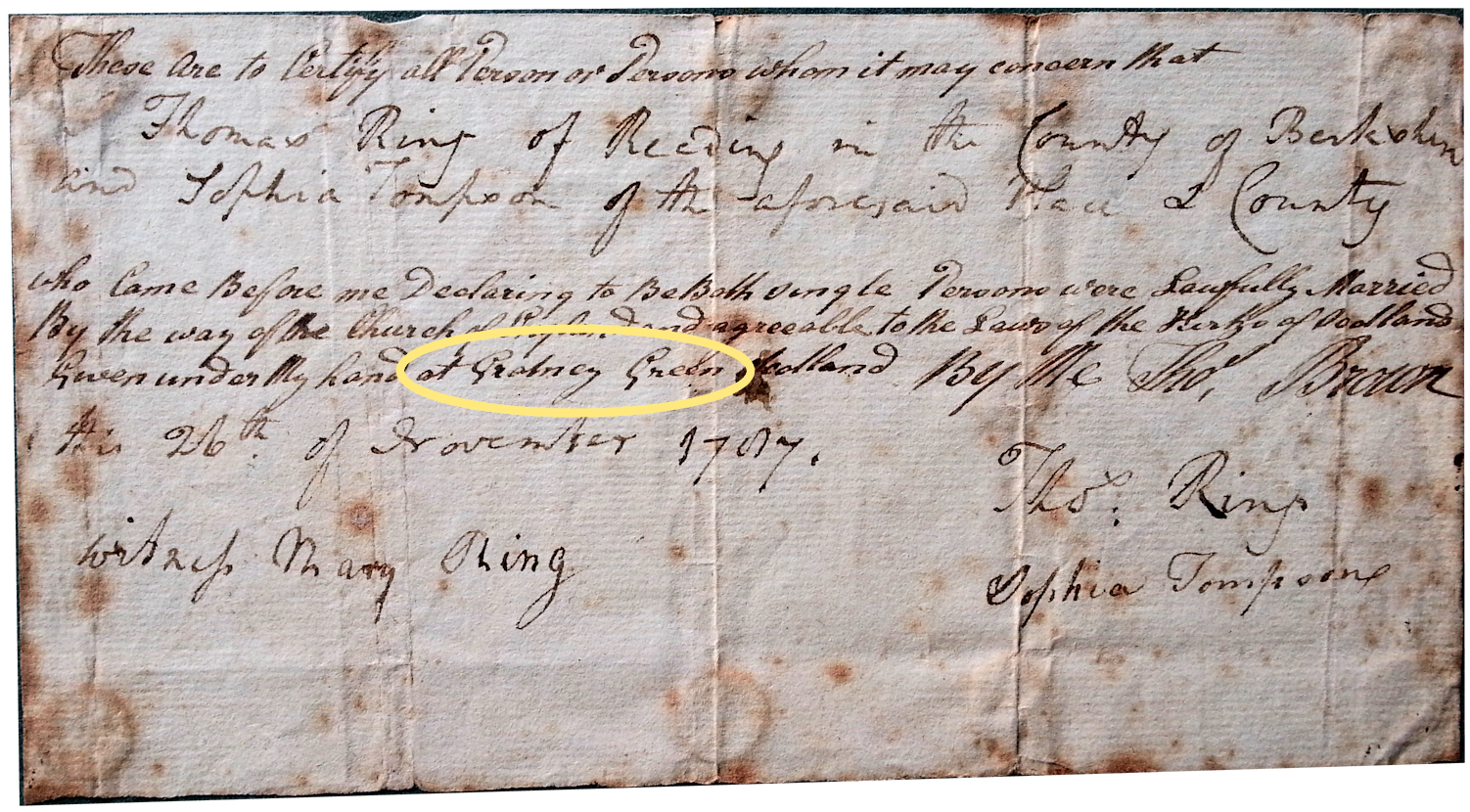 |
|
|
Thomas Ring was a medical Doctor,
practising in Market Place.

the present Market Place, Reading
|
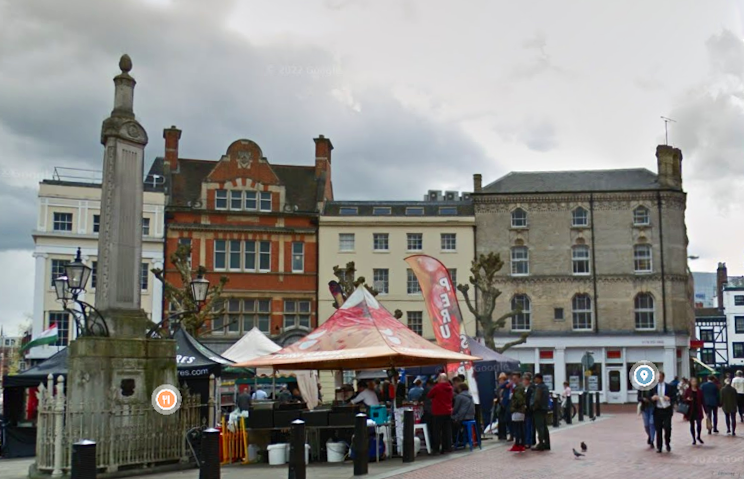 |
|
In his letter of 24 January 1794 Newton counselled the couple as they set out in their determination to follow Christ: |
|
|
We are not our own. We are bought with a price. There is but one thing to us, worth living for – that we may live to him, and for him – to show forth his praise, by obedience, by submission, by usefulness to others – in visiting the afflicted, assisting them by our sympathy, counsel, prayers, or purse, as the case requires, in supporting the cause of the Gospel, and forwarding whatever bids fair for the good of society. These aims ought chiefly to engage our time, talents and influence. Oh, what an honour [it] is to be the instruments of the Lord in defusing his benefits around us! to be the followers of Him who went about Doing good! [Acts 10:38]
|
|
That Thomas took these things to heart showed itself in many ways, including:
founding a free Dispensary:
|
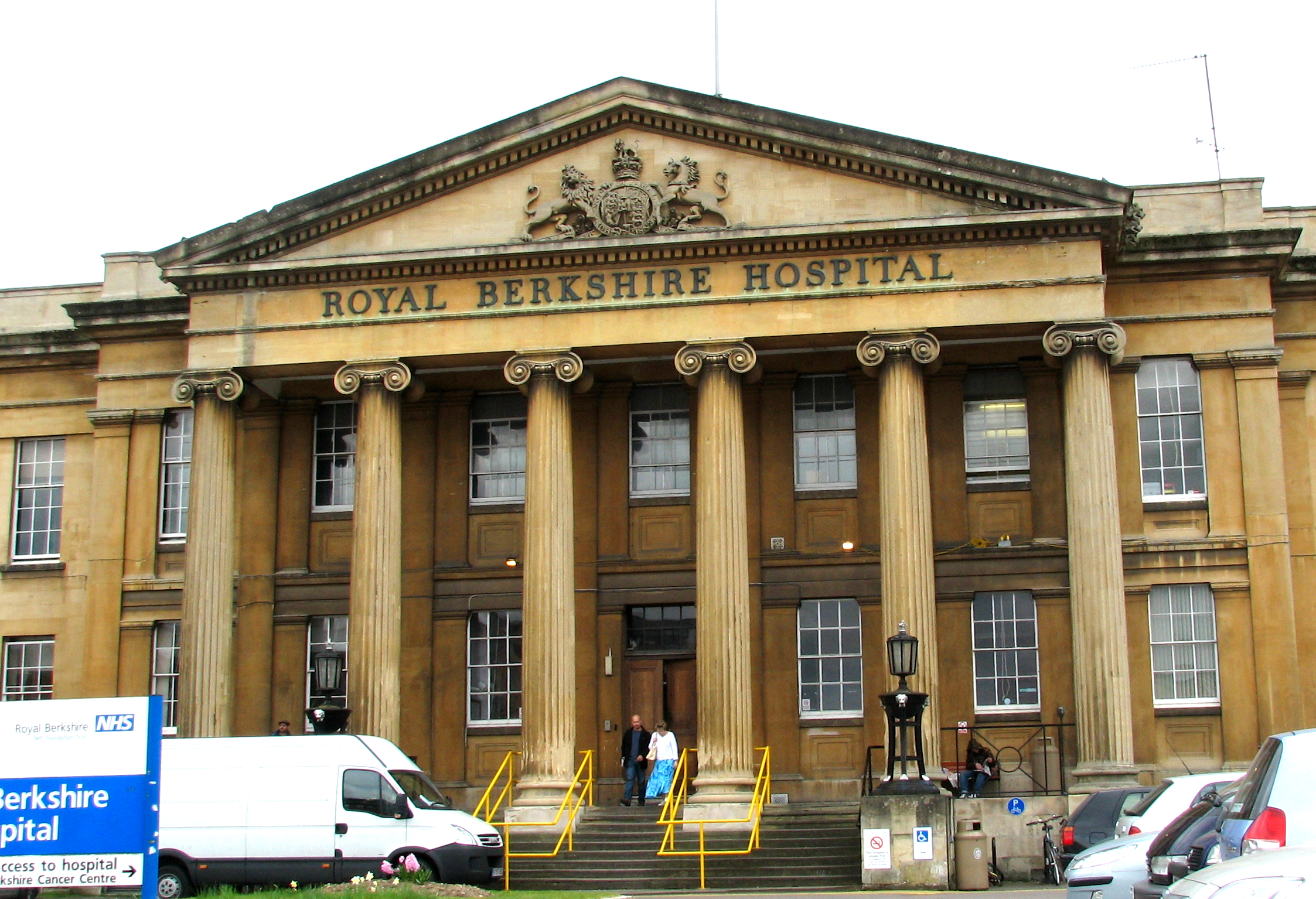 |
His obituary in The Transactions of the Provincial Medical and Surgical Association, vol 9, 1841 gives further evidence of his ‘usefulness to others’:
‘If unwearied assiduity in the discharge of his professional duties, unblemished integrity, and extensive benevolence, founded on Christian Principle, can entitle the memory of any individual to the gratitude of his fellow members, it ought to be accorded to Dr Thomas Ring, who for more than half a century was actively and extensively engaged in the practical duties of his art… he occupied a sphere of usefulness in the district of his labours, extending far beyond the circle of his professional duties: and throughout a long life he pursued undeviatingly a course of conduct highly calculated to secure the respect of the public. Such men deserve our warmest gratitude and acknowledgements, elevating, as they do, the moral influence of the medical profession… Dr Ring was the principal founder of the Reading Dispensary, and mainly instrumental in the erection of the Royal Berkshire Hospital.’ Memorial in St Laurence: ‘a fearless professor of the faith of Christ crucified’. Ring founded the Reading Dispensary in Chain Lane in 1802, offering advice and medicine free of charge to ‘the industrious poor’. |
|
Thomas and Sophia were to take another bold and very public stand, for when their much-loved rector Cadogan died suddenly on 18 January 1797, they were faced with a dilemma. |
|
|
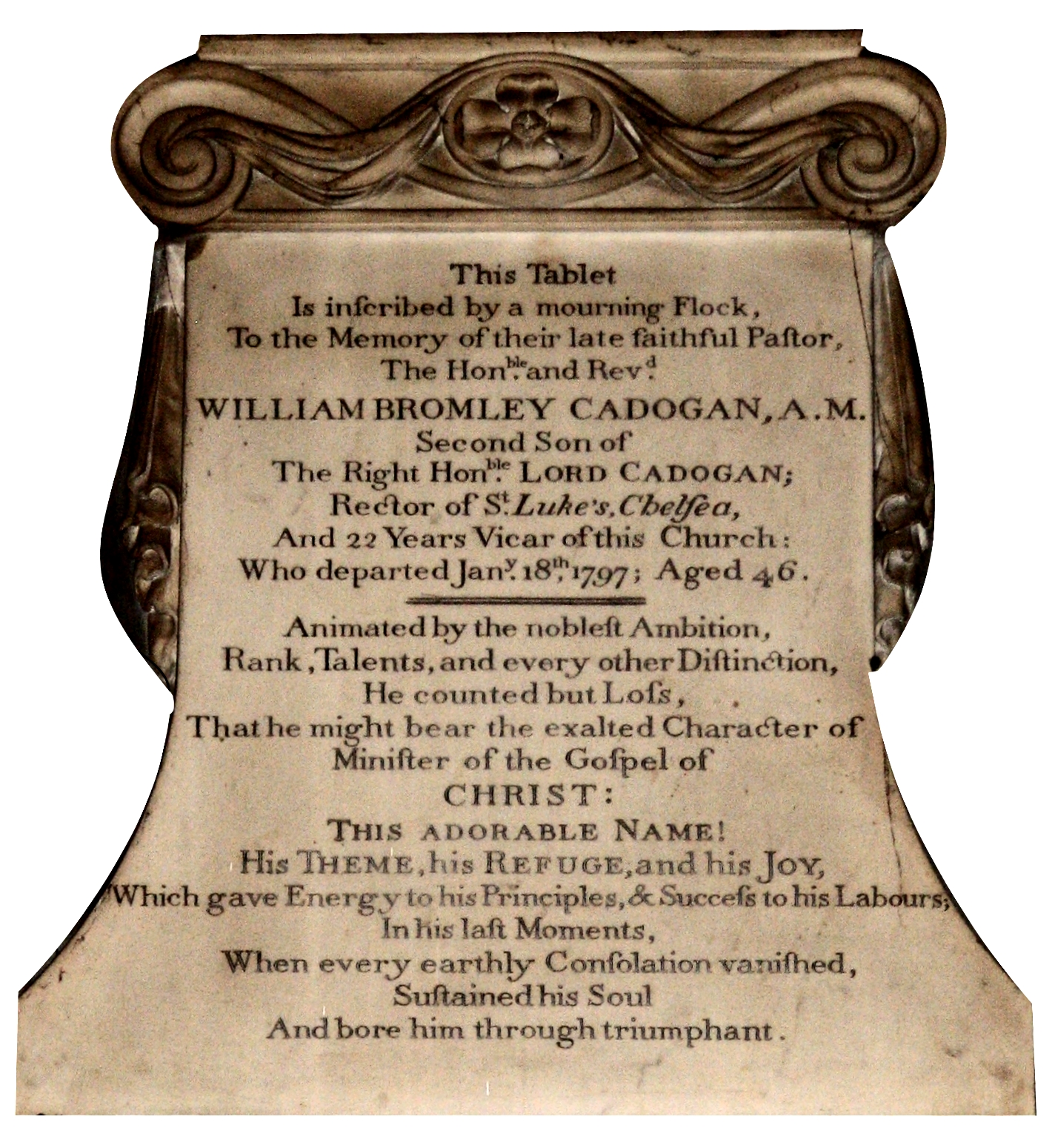 |
Memorial to Cadogan in St Giles, Reading
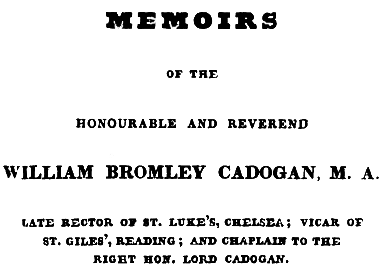 Memoirs by Richard Cecil
Memoirs by Richard Cecil

 |
|
Newton spent a few days with them in July 1797, reporting to his friend William Bull, ‘The people were hungry, the Lord made me able and willing, the time was short, so we made the most of it. I never preached so often in an equal space: five times in the church, twice in Mr Young's school, every morning at Mr Rings, and every evening in a large room of one or other of our friends.’ |
|
With Cadogan’s substitute increasingly departing from Scriptural truths, Newton advised them in his letter of 5 August 1797: |
|
|
‘I think you are all free, as matters stand, to hear the Gospel, how or where you please, or can. Only I would advise you to keep a rallying Point, to have some place and times for meeting together, In a Body, and As a Body, considering yourselves as still bearing the same relation to each other, that you did in Mr Cadogan’s time.’
|
|
When they turned elsewhere for reliable teaching, Newton chided them for separating and not attending the same place of worship together: ‘Cannot you compromise the matter and go sometimes to one place, sometimes to the other, but Always together?’ He ‘rather wondered’ and was ‘sorry’ that Thomas was going to St Lawrence [Laurence] where the Gospel was not preached. ‘I love the church to which I belong, but without the Gospel, it seems like a Shell without a Nut.’ |
|
They began to look around for an alternative Anglican ministry. When Cadogan’s replacement Joseph Eyre coaxed them into a Visitation service where he insulted his evangelical church members sharply in front of the Bishop, accusing them all of ‘hypocrisy’, ‘infidelity’, ‘a love of novelty, a love of power’, ‘misinterpreting Scripture’, ‘seceding’ not only from the Church but ‘from the State’, ‘bigotry’, ‘seduction’, ‘vehemence’, ‘violence’, ‘jealousy’, ‘strife’, ‘bitterness’, ‘rancour’ and ‘attack’, Newton responded in his letter of 4 August 1798: |
|
|
I judge that you are not only warranted but bound to vindicate yourselves from the assertion, and to state your reasons, and show the absolute necessity you were under for building a Chapel and providing a Preacher, who would not contradict from the Pulpit, what you had been long accustomed and pleased to hear from the Desk.
|
|
He urged them to keep to the Church of England’s doctrine which was being denied by the vicar: |
|
|
You have the advantage of the Ground, if you keep close to the Scripture, Articles, and Liturgy. And if you preserve a meek and loving spirit avoiding all tartness and bitterness of expression, you will gain an easy Victory; for Truth, which is on your side, is Great, and must prevail.
|
|
A lengthy search for a suitable minister followed, a chapel was built and at last they established a spiritual home. It was later named St Mary’s Castle Street (not to be confused with the then unwelcoming St Mary’s parish church). |
|
|
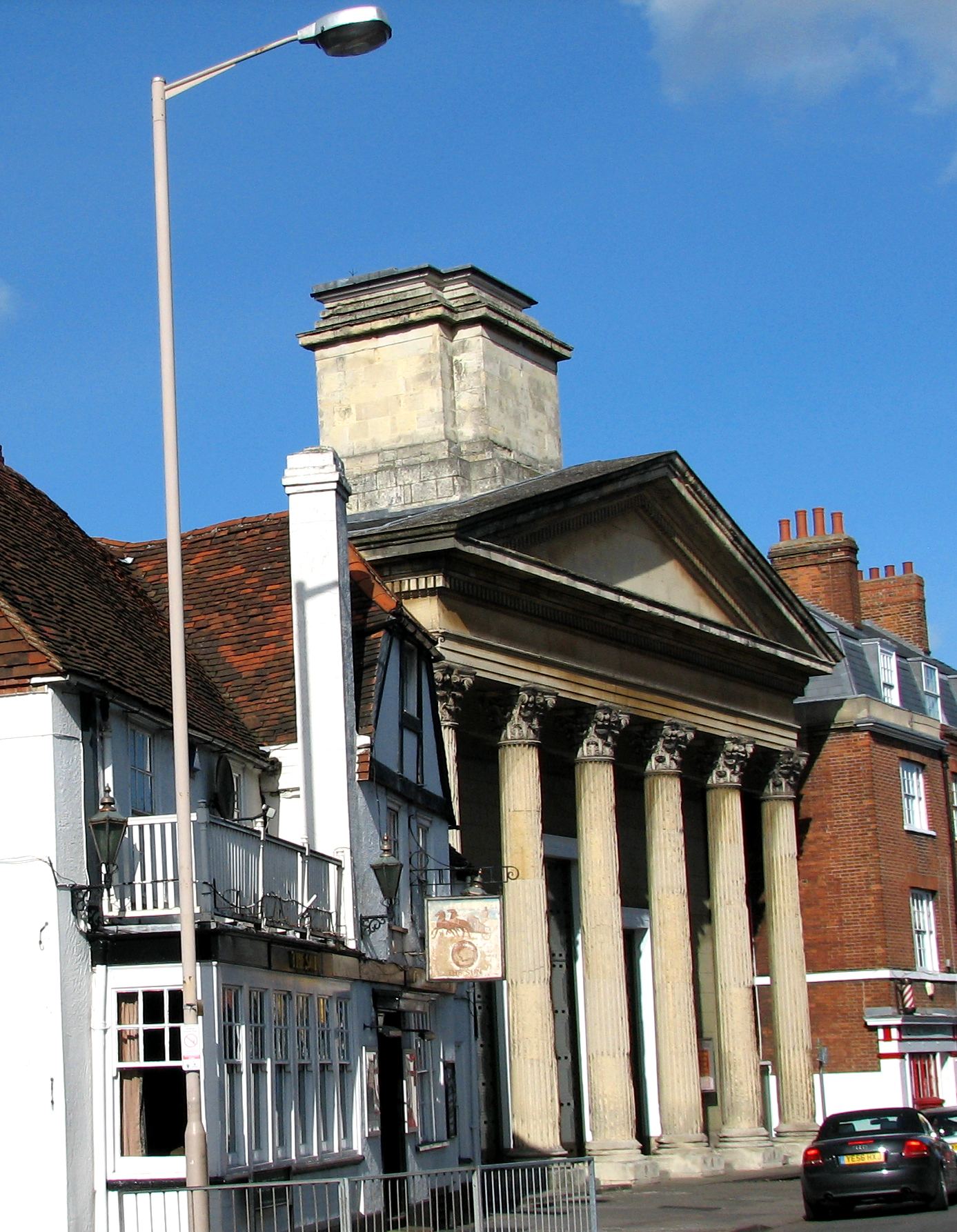 |
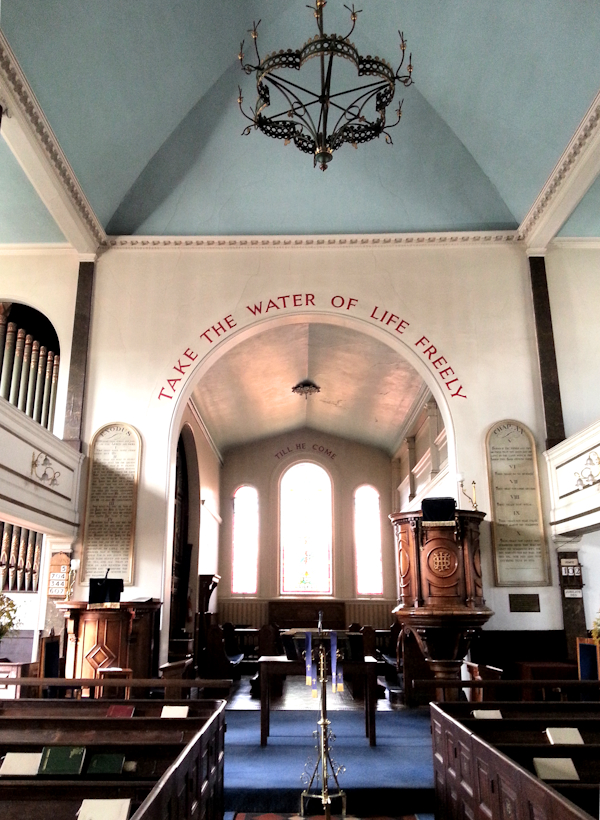 |
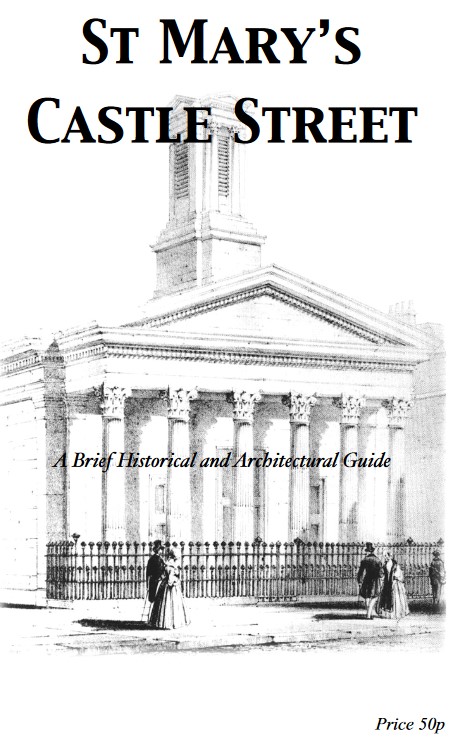
|
|
One of its first ministers was Henry Gauntlett (1762-1833), known to Newton, and who would later become the vicar of Olney where Newton had ministered for 16 years. |
Sophia Ring later published edited extracts from three of these letters where Newton counselled and advised them on finding a godly way through this difficult time.
|
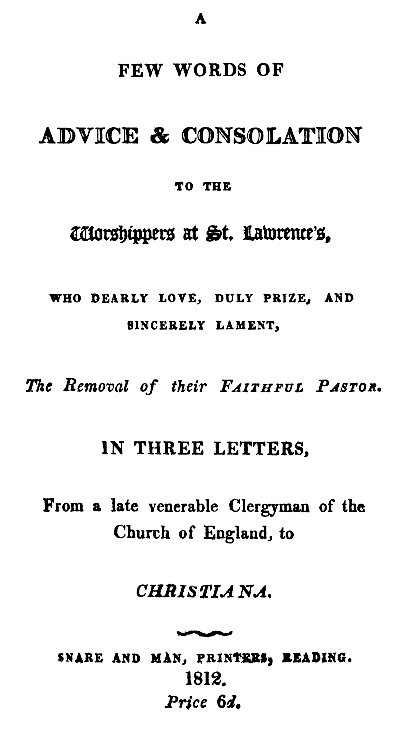 |
A Few Words of Advice & Consolation to the Worshippers at St Lawrence’s who dearly love, duly prize, and sincerely lament, The removal of their Faithful Pastor.
In Three Letters, From a late venerable Clergyman of the Church of England, to Christiana.
Snare and Man, Printers, Reading.
1812.
Price 6d. |
With the Rings’ problems being resolved, Newton himself entered new trials. Betsy, who had suffered a ‘very long and dangerous illness’ immediately prior to the death of Newton’s wife Mary/Polly from cancer, had a relapse. Betsy had added a note to Newton’s letter of 12 January 1801. Her illness seems to have started soon after that.
As a medical doctor, Thomas Ring was now able to be of some help to Newton. In his letter of 2 May 1801 Newton exclaimed:
|
|
|
My trial is great, I am touched in a tender point. For she has been by the Lord’s blessing, the chief temporal staff and comfort [in my] old age, since her dear Mama's departure. |
|
|
Betsy had apparently been spending some time in Reading with the Rings, and subsequent letters reveal much assistance being sought from and offered by the young couple. Thomas offered the use of his farm cottage in Caversham, across the river from Reading, for a quiet stay for Betsy and her companion.
Writing to his friend William Bull(1738-1814) from the Rings’ home in Reading on 20 May 1801 Newton said: |
|
|
I believe either you or my good friend Mr Thomas, have seen dear Mr Ring’s cottage. It is a delightful spot. There my dear Eliza [Besty] is under the care of faithful Crabb. There she has every advantage that fine air, extensive prospects, convenient walks, and the best medical advice can afford; and there she must be for a season, till we see more of the Lord’s will. She is in safe hands.
old Caverhsam across the river from Reading
|
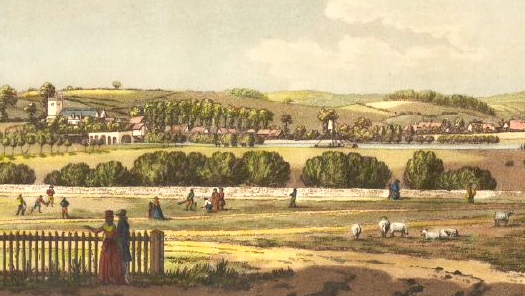 |
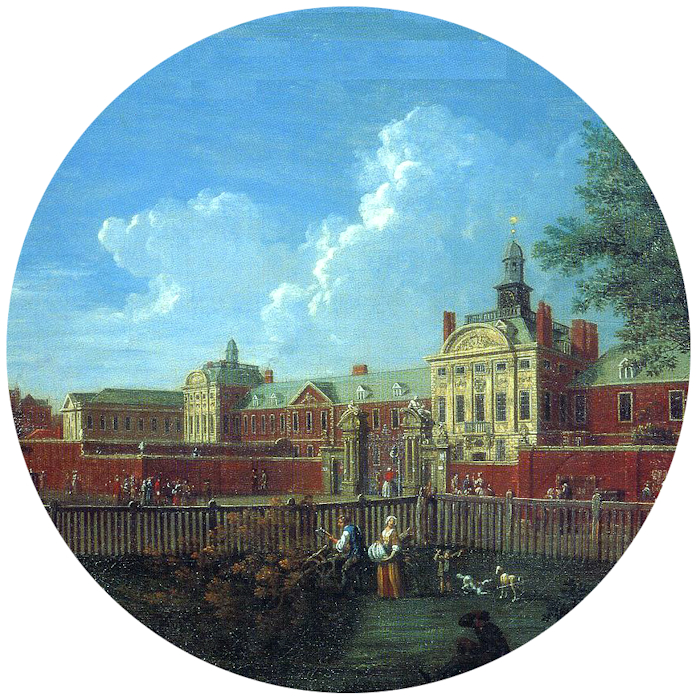
Bethlem Hospital
(Bedlam)
|
Despite everyone’s best attempts, it eventually became necessary for Betsy to be admitted to Bethlem Hospital (known as Bedlam) on 1 August 1801. This was a tremendous trial for Newton, who by then was almost blind. |
|
August 1 1801
'The following patients were admitted:'
|
 |
 |
Betsy was eventually discharged on 24 July 1802, having proved able to cope at home on a month’s leave.
Nevertheless her recovery was slow. |
|
Images taken from HCM-19 and used by permission of Bethlem Museum of the Mind. |
|
Betsy married Joseph Smith (d 1825), an optician at the Royal Exchange, at St Mary Woolnoth on 2 May 1805. They lived with Newton at No. 6 Coleman Street Buildings and cared for him in his old age.
St Mary Woolnoth, Lombard Street
A valuable part of these letters is Besty’s unique first-hand account of Newton in his last days.
On 30 October 1805 Betsy wrote: |
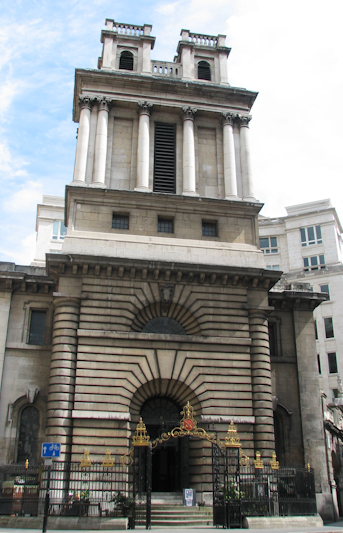 |
|
|
‘My dear Father has been but poorly lately as his legs have begun swelling a good deal which is an unfavourable symptom at his time of life; we think him better than he was and have abundant cause for thankfulness that the Lord has been graciously pleased to spare him to us so long under such favourable circumstances that he is exempted from great pain, able to eat and sleep and still preaches though for the three last times he could not stay to conclude the Service on account of the weakness he has had for some years which must be expected to increase rather than otherwise.’ |
|
200th anniversary of Trafalgar
|
St Mary Woolnoth Register records:
'The last time he officiated in this church was Sunday evening October 5th 1806 [when he preached in aid of the widows and orphans of the Battle of Trafalgar], and the last time he was at divine worship in it was Sunday morning January 4th 1807.'
last diary entry:
|
Newton's pulpit
|
|
On 18 November 1806 Betsy recorded: |
|
|
Through much mercy my dear Father is still able to go to Church though I believe he has quite given up preaching; his weakness is much increased since we had the pleasure of seeing you; he expresses much satisfaction in Mr Smith's kind attention to him which you know cannot fail to be pleasing to me. |
|
The very last record we have of Newton before his death on 27 December 1807, is this report from Betsy on 5 December 1807: |
|
|
…it is a pleasing and a painful service to attend on him – pleasing to see such sweetness and composure of mind that everything is right that is done for him; if we ask in a morning whether we shall remove him to the other side of the bed he generally answers "do what you like with me” and one morning he said "any end, any side, do as you please with me…
He told us the other evening he wanted to show forth the praises of the Redeemer or to that effect and then added "Thou dear Redeemer dying Lamb" with the next verse. |
|
This hymn was written by the Moravian John Cennick (1718-1755), who, co-incidentally, had been born in Reading: |
|
|
Thou dear Redeemer, dying Lamb,
I love to hear of Thee;
No music like Thy charming Name,
Is half so sweet to me.
O let me ever hear Thy voice
In mercy to me speak!
And in my Priest, will I rejoice,
My great Melchizedek. |
My Jesus shall be still my theme,
While in this world I stay;
I’ll sing my Jesus’ lovely Name
When all things else decay.
When I appear in yonder cloud,
With all Thy favoured throng,
Then I will sing more sweet, more loud,
And Christ shall be my song. |
|
Betsy continued: |
|
|
It is a great mercy that my dear Father suffers but little pain that he can sleep well and eat as much as is requisite though no meat, he takes a good many eggs, broth etc he likes tea as well or better than anything else; he gets up to dinner every day and seldom lies down afterwards. He sits up till 9 o’clock. The symptoms of dropsy have wonderfully disappeared for some time and he has got very thin not till within these few days have I perceived his legs swell in some degree; it may proceed from weakness as that certainly increases and it must be expected. I must close my little chit chat account of him by saying that we have abundant cause to be thankful that the Lord deals thus gently and tenderly with him, and through him with us likewise. |
|
Finally, on 28 December 1807 came a brief note from Betsy thanking the Rings for their ‘kind and affectionate Letter’ after her dear Papa had died.
|
|
Several more letters followed. A most moving reflection comes in that of 22 January 1808, recalling their visit to Reading, in July 1800, when they were escorted by the Rings to Basingstoke for an overnight stay before catching the coach to Southampton to visit the Taylors of Portswood Green for what proved to be their last holiday there. Thomas’s widowed mother, Ann, lived in a house backing on to the rectory – now numbered 81-83 Church Street. |
|
It proved a most memorable occasion for Betsy, as she reflected in her letter of 12 January 1801 to Sophia Ring: |
|
|
‘I often think of our singing the night before we left them and wish you could think of the name of the tune which you could not then, the words: ‘The Lord will provide’. That hymn has been made a blessing to many in seasons of distress; the mother of a family at Olney who in these calamitous times have hardly bread to eat, wrote me word lately it had been a comfort to her. I think sometimes the poor in the country suffer more as they have less to do with than those in London, but their case is truly pitiable everywhere at present.’ |
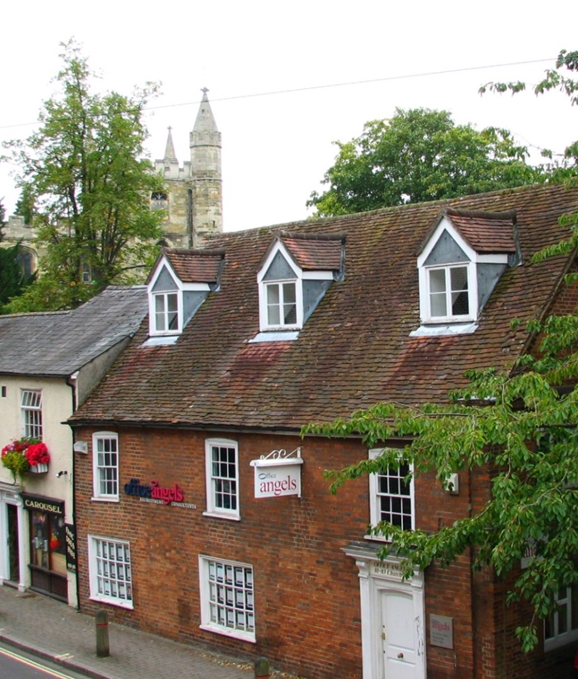 Ann Ring's home in Basingstoke Ann Ring's home in Basingstoke |
|
It would have been perfectly natural for them to have sung Newton’s hymn ‘Jehovah-Jireh, The Lord will provide’. |
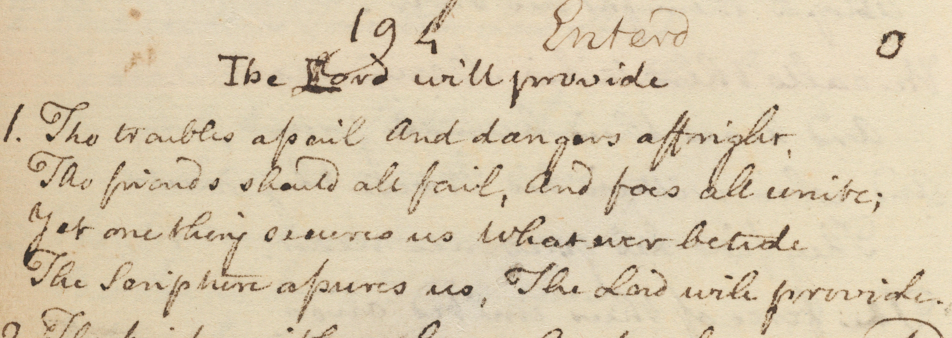 |
From Olney Hymns, Book 1, Hymn 7
GENESIS 22:14, Jehovah-Jireh, The LORD will provide
 |
|
|
Though troubles assail,
And dangers affright,
Though friends should all fail,
And foes all unite;
Yet one thing secures us,
Whatever betide,
The scripture assures us,
The LORD will provide. |
|
His call we obey,
Like Abram of old,
Not knowing our way,
But faith makes us bold;
For though we are strangers,
We have a good guide,
And trust in all dangers,
The LORD will provide. |
|
What a tremendous comfort for Betsy to recall this particular hymn, one of the last they sang together, as she now set out on life’s journey without her dear Papa, ‘not knowing her way’, but ‘trusting in all dangers’, that The Lord will provide. |
Acknowledgements:
Descendants of Sophia Ring
British Library
Lambeth Palace Library
Museum of the Mind (Bethlem archives)
Princeton University
St Mary's Castle Street
|
|
|